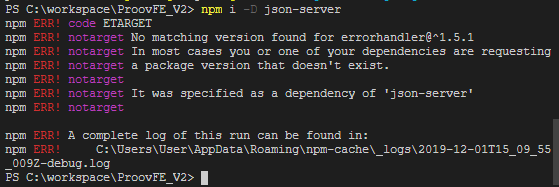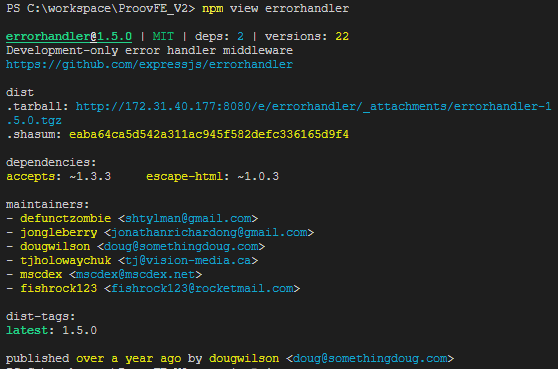expressjs / errorhandler Goto Github PK
View Code? Open in Web Editor NEWDevelopment-only error handler middleware
License: MIT License
Development-only error handler middleware
License: MIT License
Hi,
I was trying to npm i -D json-server. unfortunately, I got the following error:

I checked errorhandler at npm, and indeed the version is clearly 1.5.1:

However, npm view errorhandler shows a different version:

FYI
Related issue: No matching version found for errorhandler@^1.5.1
LoopBack users are asking for an option to suppress stack traces when running in production - see strongloop/loopback#564, strongloop/loopback#1502 and strongloop/strong-remoting#87. So far, we have implemented this feature at our side, but think it would be nice to upstream that changes and make this feature available to all errorhandler users.
I can see two rules for deciding whether the stack should be included or not:
Perhaps we can implement both of them?
Thoughts?
under Usage: isn't there a missing semicolon after the app.use() call?
I'm new in this. I have this code:
var express = require('express')
var responseTime = require('response-time')
var errorhandler = require('errorhandler')
var app = express()
// view engine
app.set('view engine', 'jade')
// middleware
app.use(express.static('public'))
app.use(responseTime())
app.use(errorhandler({log: false}))
app.get('/', function (req, res) {
// res.render('index')
fails()
})
app.listen(3000)
When I hit / I thought I should get the errorhandler in styled html, but it just shown like this:
What should I do to show the errorhandler html on the response??
Hi,
In index.js there is this holder:
/*!
* errorhandler
* Copyright(c) 2010 Sencha Inc.
* Copyright(c) 2011 TJ Holowaychuk
* MIT Licensed
*/
while README.md specify this one:
Copyright (c) 2014 Jonathan Ong [email protected]
can you please clarify copyright information, in case, unifying both ?
If doing throw {a: 'a', b: [ { c: 'c' } ]} you get the output
{ a: 'a', b: [ { c: 'c' } ] }
It would be more readable, especially for larger objects, if it were pretty-printed instead of on one line and no indentation like above.
If doing throw Error({a: 'a', b: [ { c: 'c' } ]}), the first line of the output before the stack trace is
Error: [object Object]
Which is fine, but it would also be very useful to output, elsewhere on the page, a pretty-printed output of the object passed in to the Error object. Otherwise you would have to use a debugger or insert console.log commands in your code to get at the object.
Google APIs are returning error messages in following format:
{
errors: [{
domain: 'global',
reason: 'authError',
message: 'Invalid Credentials',
locationType: 'header',
location: 'Authorization'
}],
code: 401,
message: 'Invalid Credentials'
}
statusCode is here under code property not status.
NPM cannot resolve the package from the registry.
npm ERR! 404 Not Found - GET https://registry.npmjs.org/errorhandler
Hi This is a question like the title, the loopback framework is using err.statusCode to expose the http status code. And I did know the preprocessor would address the issue.
However, I just think why not supporting statusCode from the error object, the node core is using this name, so should we use this as well?
Thanks !!!
I'm trying to understand the reason of usage of String() in
// write error to console
if (env !== 'test') {
console.error(err.stack || String(err))
}In my scenario, I use plain a lot plain objects as error objects. For instance,
someCall(param, function (err, result) {
if (err) {
// here error is something like {message: 'server error', status: 401};
return next(err);
}
// ...
});While String(err) will output [object Object] in console, instead of {message: 'server error', status: 401}. I thought it's done by mistake, but saw few tests explicitly verifying this scenario.
Could you please explain the rationale behind that? Why not just || err for not Error instances?
I don't need {error: {...}}, could we change the output structor?
Some errors, like those that less.js generate when it can't find an import do not contain a .stack parameter. When that happens in a text/css request this library cryptically generates no output and prints "undefined" to stderr.
A declarative, efficient, and flexible JavaScript library for building user interfaces.
🖖 Vue.js is a progressive, incrementally-adoptable JavaScript framework for building UI on the web.
TypeScript is a superset of JavaScript that compiles to clean JavaScript output.
An Open Source Machine Learning Framework for Everyone
The Web framework for perfectionists with deadlines.
A PHP framework for web artisans
Bring data to life with SVG, Canvas and HTML. 📊📈🎉
JavaScript (JS) is a lightweight interpreted programming language with first-class functions.
Some thing interesting about web. New door for the world.
A server is a program made to process requests and deliver data to clients.
Machine learning is a way of modeling and interpreting data that allows a piece of software to respond intelligently.
Some thing interesting about visualization, use data art
Some thing interesting about game, make everyone happy.
We are working to build community through open source technology. NB: members must have two-factor auth.
Open source projects and samples from Microsoft.
Google ❤️ Open Source for everyone.
Alibaba Open Source for everyone
Data-Driven Documents codes.
China tencent open source team.